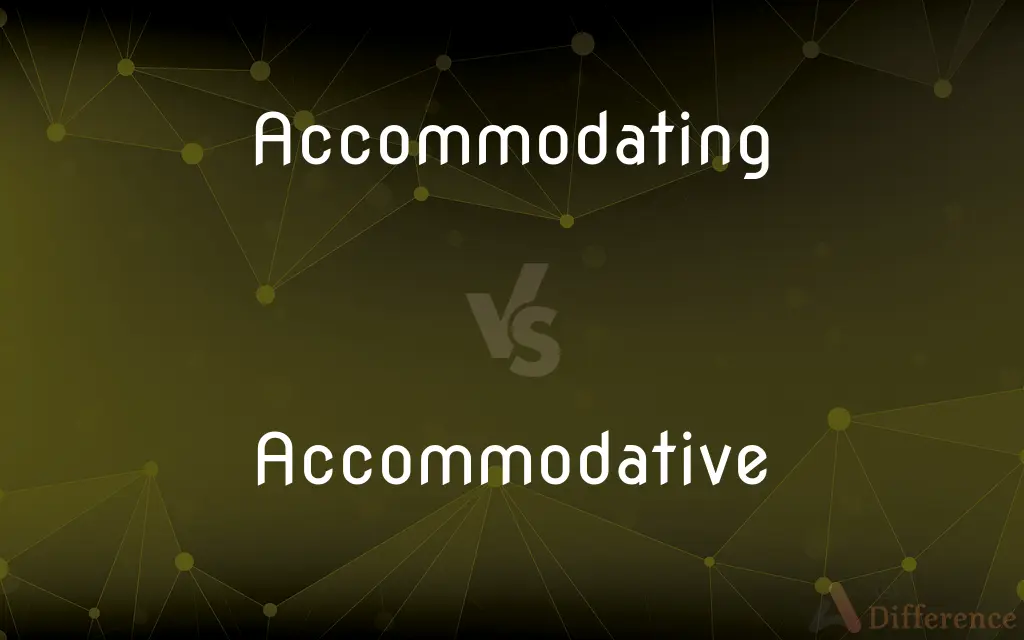Accommodating vs. Accommodative — What's the Difference?
By Urooj Arif & Fiza Rafique — Updated on March 31, 2024
Accommodating refers to the act or disposition of being helpful or willing to do a favor, while accommodative specifically relates to adjusting or adapting to someone's needs or demands.

Difference Between Accommodating and Accommodative
Table of Contents
ADVERTISEMENT
Key Differences
Accommodating is often used to describe a person's nature or behavior that is helpful, obliging, and ready to do a favor or provide service to others. It suggests a willingness to go out of one's way to be of assistance. On the other hand, accommodative is a term more frequently used in specific contexts, such as economics (accommodative monetary policy) or physiology (accommodation of the eye), to describe adjustments or adaptations to certain conditions or changes.
While "accommodating" primarily highlights the general attitude and actions of individuals or entities willing to assist and make concessions for others' comfort, "accommodative" is more about the capacity or specific actions taken to adjust or adapt to someone's needs, often within a technical or specialized context. For instance, an accommodative stance by a central bank involves adjusting monetary policy to support economic growth.
The nuance between these terms also extends to their application; "accommodating" can be applied broadly in social, work, or family situations where assistance and cooperation are emphasized. In contrast, "accommodative" is often used in discussions about policies, systems, or mechanisms designed to adjust or respond to particular needs or conditions.
In terms of interpersonal relationships, an accommodating person is someone who is flexible, considerate, and willing to help out or compromise for the benefit of others. This term conveys a sense of generosity and thoughtfulness. Conversely, an accommodative approach or measure implies a deliberate adjustment or adaptation, highlighting a responsive or flexible strategy rather than a personal quality.
Both terms suggest a readiness to adjust or make concessions, but "accommodating" tends to focus more on the willingness or behavior of people, whereas "accommodative" points to specific actions, policies, or mechanisms intended to adjust or adapt to certain conditions or requirements.
ADVERTISEMENT
Comparison Chart
Definition
Being helpful or willing to do favors; obliging.
Adjusting or adapting to someone's needs or conditions.
Usage Context
Describes a person's nature or behavior in social or professional settings.
Often used in technical or specialized contexts, such as economics or physiology.
Focus
Highlights a general attitude of assistance and cooperation.
Emphasizes the capacity or action taken to adjust or adapt to specific needs.
Application
Broad, covering social, work, and family dynamics.
More specific, relating to policies, systems, or physiological responses.
Implication
Suggests a personal quality of generosity and consideration.
Points to deliberate adjustments or adaptations made in response to certain conditions.
Compare with Definitions
Accommodating
Ready to make concessions for others' comfort.
The company’s accommodating policy allows remote work.
Accommodative
Responsive to requirements or demands.
The software’s accommodative design allows for extensive customization.
Accommodating
Helpful and cooperative.
The team was accommodating to the new member, ensuring a smooth transition.
Accommodative
Adapting to conditions or changes.
Accommodative monetary policies aim to stimulate economic growth.
Accommodating
Willing to help or do a favor.
She’s always accommodating when friends need a place to stay.
Accommodative
Adjusting to someone's needs.
The teacher’s accommodative approach helped students with different learning styles succeed.
Accommodating
Considerate of others’ needs.
Being accommodating to guests’ dietary preferences is important in hospitality.
Accommodative
Capable of being adapted.
An accommodative mechanism in the eye enables it to focus on objects at various distances.
Accommodating
Flexible and obliging in nature.
His accommodating manner makes him an excellent host.
Accommodative
Flexible in strategy or approach.
The company’s accommodative stance on work hours boosted employee morale.
Accommodating
Helpful and obliging.
Accommodative
To have enough space for
A parking lot big enough to accommodate buses.
Accommodating
Affording, or disposed to afford, accommodation; obliging; helpful.
Accommodative
To provide lodging for
We looked for a hotel to accommodate the extra guests.
Accommodating
Pliable; easily corrupted.
Accommodative
To take into consideration or make adjustments for; allow for
An economic proposal that accommodates the interests of senior citizens.
Accommodating
Present participle of accommodate
Accommodative
To do a favor or service for; oblige.
Accommodating
Affording, or disposed to afford, accommodation; obliging; as an accommodating man, spirit, arrangement.
Accommodative
To provide for; supply with something needed
Accommodated the expedition with supplies.
Accommodating
Helpful in bringing about a harmonious adaptation;
The warden was always accommodating in allowing visitors in
Made a special effort to be accommodating
Accommodative
To make suitable; adapt or adjust
Accommodated herself to her new surroundings.
Accommodating
Obliging; willing to do favors;
Made a special effort to be accommodating
Accommodative
To adapt oneself; become adjusted
It is never easy to accommodate to social change.
Accommodative
(Physiology) To become adjusted, as the eye to focusing on objects at a distance.
Accommodative
Supplying with or obliging; accommodating.
Accommodative
Helpful in bringing about a harmonious adaptation;
The warden was always accommodating in allowing visitors in
Made a special effort to be accommodating
Accommodative
Willing to adjust to differences in order to obtain agreement
Accommodative
Tending to reconcile or accommodate; bringing into harmony
Common Curiosities
Is accommodating a positive trait?
Yes, being accommodating is generally viewed as a positive trait, indicating a considerate and helpful disposition.
What does accommodating mean?
Accommodating refers to being helpful, obliging, and willing to assist or make concessions for others' comfort.
What does accommodative mean?
Accommodative relates to adjusting or adapting to someone's needs, conditions, or demands, often in a technical or specialized context.
Can policies be accommodating?
Policies can be described as accommodating when they are designed to be flexible and helpful, though "accommodative" might be more precise for policies specifically adapted to meet certain conditions.
Can a person be described as accommodative?
Yes, a person can be described as accommodative, especially when they adjust their actions or decisions to cater to others' needs.
What is an example of an accommodative policy?
An accommodative monetary policy by a central bank, which lowers interest rates to stimulate economic growth, is an example.
What is the difference in focus between the two terms?
Accommodating focuses on a person's willingness to help, while accommodative emphasizes adjustments or adaptations to meet specific needs.
How do you use accommodating in a sentence?
"The hotel staff was very accommodating, arranging transportation and providing local dining recommendations."
Can being too accommodating be a disadvantage?
Yes, being overly accommodating might lead to neglecting one's own needs or boundaries in an effort to please others.
Can a company’s culture be described as accommodating or accommodative?
Yes, a company's culture can be described using both terms, depending on whether the emphasis is on the general helpfulness of individuals within the company or on specific policies designed to adjust to employee needs.
How do you use accommodative in a sentence?
"The central bank's accommodative stance has been crucial in the country's economic recovery efforts."
Is there a difference in application between accommodating and accommodative?
Yes, "accommodating" is more broadly applicable to behaviors and dispositions, while "accommodative" is often used for specific adjustments or adaptations in policies or systems.
What makes a policy accommodative?
A policy is accommodative when it is specifically designed or adjusted to support or stimulate certain outcomes, such as economic growth.
How does being accommodating affect relationships?
Being accommodating can positively affect relationships by showing consideration and willingness to support others, fostering goodwill and cooperation.
Why is adaptability important in being accommodative?
Adaptability is crucial in being accommodative because it allows individuals or systems to effectively respond to changing needs or conditions, ensuring relevance and support.
Share Your Discovery

Previous Comparison
Mantle vs. Cape
Next Comparison
Capstan vs. WindlassAuthor Spotlight
Written by
Urooj ArifUrooj is a skilled content writer at Ask Difference, known for her exceptional ability to simplify complex topics into engaging and informative content. With a passion for research and a flair for clear, concise writing, she consistently delivers articles that resonate with our diverse audience.
Co-written by
Fiza RafiqueFiza Rafique is a skilled content writer at AskDifference.com, where she meticulously refines and enhances written pieces. Drawing from her vast editorial expertise, Fiza ensures clarity, accuracy, and precision in every article. Passionate about language, she continually seeks to elevate the quality of content for readers worldwide.















































